
Ministerial candidates in the Church of the Brethren may seek training for service in various ways, one of which is at the denomination's theological school located on its newly acquired campus at Richmond, Indiana, in association with the Earlham School of Religion. Although now unofficial, this web site was the first online to tell the story of how Bethany offers several platforms of higher education such as graduate and non-degree programs, foreign study tours, along with Academy programs for continuing educational training, plus specialized workshops and field opportunities. But equipping the church for leadership requires more than academic curriculum and the dispensing of knowledge, it needs to develop men and women of faith through personal growth and cross cultural experiences who discern a keener vision of Christ's mission for our world. Service and ministry in a world of diverse cultures also requires bridges of understanding. Bethany encourages awareness of diversity in the learning process through study tours to foreign countries, and the presence of international students on campus. Bethany also reaches out directly to congregations with opportunities for education through workshops and specialized courses.
In affirmation of the need to participate in the broad theological arena of ideas, Bethany has been affiliated with other schools, universities, and institutions; such as General Conference Mennonites, Baptist Theological Seminary, and the Earlham School of Religion. Additionally, there are many other educational resources available to students at Bethany, including United Theological Seminary in Dayton, the University of Dayton, Payne Theological Seminary in Wilberforce, Hebrew Union college in Cincinnati, and Christian Theological Seminary in Indianapolis. Since the greatest demographic concentration of Brethren exists in the Mid-Atlantic area, Bethany has established the Susquehanna Valley Satellite program at Elizabethtown College where ministerial candidates have not only the resources of the host campus, but also graduate opportunities at four other area schools; Evangelical School of Theology in Myerstown, Lancaster Theological Seminary, and Eastern Mennonite Seminary.
Contact Us:
If you are interested in ministry within the Church of the Brethren, we hope that you will explore our facilities and academic resources. Please request an admissions catalog, and give us the opportunity to explain our curriculum and possibilities for education.
|
Bethany Theological Seminary 615 National Road West Richmond, IN 47374-4019 Phone: (800) 287-8822 (765) 983-1800 |
Susquehanna Valley Ministry Center One Alpha Drive Elizabethtown College Elizabethtown, PA 17022-2298 (717) 361-1450 |
How to Locate Us:
Bethany is located in Richmond, Indiana which is just south of Interstate Route 70. Our buildings are located on the campus of the Earlham School of Religion, at the intersection of US Route 40 and College Avenue. West bound travelers on Interstate 70 may wish to use Exit 156, in order to switch to Route 40 (also National Road West), and East bound travellers on Interstate 70 may wish to use Exit 151 to switch to Route 27, which then intersects Route 40 in downtown Richmond.
Earlham was founded by the Society of Friends (Quakers) who also founded many other institutions of learning, such as Haverford, Bryn Mawr, Swathmore, Johns Hopkins, and Cornell University. Bethany also shares curriculum and additional facilities with Earlham School of Religion.
History of Ministry in the Church of the Brethren
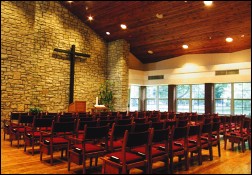
Nicarry Chapel
Originally, the free ministry was observed in German Baptist Brethren congregations. Ministers did not receive a salary, wage, or stipend for their spiritual contributions. For this reason it was not uncommon for a church to have several ministers who earned a living from a separate occupation. There were few, if any, salaried Brethren ministers during the first half of this century. Brethren subscribed to free ministry so as to keep the allegiance of the speaker in harmony with the Holy Spirit, and not diminished by financial conflicts with congregations. Some were farmers, others skilled craftsmen. Ministers were acquired through various selection methods to fulfill the office of minister, and would then advance through Three Degrees of office. A first degree minister could preach a single sermon, or with permission, conduct the entire worship service. Second degree ministers were authorized to perform a baptism and conduct a love feast. Third degree ministers or elders had attained the highest degree, and were charged with the spiritual welfare of entire congregations. Usually there were a few years of apprenticeship in each office before one may attain the next higher degree. Several ministers would serve a congregation, so as not to burden any one person with too much responsibility. It was not uncommon for larger Brethren churches to have six to eight ministers with three of them preaching a sermon each Sunday morning.
The prevailing concept deemed the ministerial role as a divine obligation that should be liberated from temporal entanglements. Remuneration was perceived as merchandising the gospel. It was also feared that paid ministers would become merchants with a greater proclivity towards satisfying the consumer with less intensive sermons. Unpaid ministers with sole allegiance to God might be more inclined to regularly preach sermons that 'step on toes' and preserve the fundamentals of the faith, especially the historic traditions of Brethrenism.
Depending on the location and size of the congregation, ministers were generally selected or elected along the following scheme. As the congregation sensed the need for an additional minister, each member would privately spend time considering which of the young men of the congregation would be most suited for the office. Elders from nearby congregations would convene a special day of examination to question members on their choice. One by one each member would go into a private room with the elders and respond to questions regarding their preference. There were no ballots or nominations, for this was selection by plurality. After reviewing the entire membership, the elders would emerge to inform the congregation of their decision. This practice was later challenged because it may allow a minority of voices to select a minister. During the last half of the century, new voices called for open elections with ballots and nominations so that any selection would be consequential to a majority of the congregation. Traditional voices did not like the democratic scheme because it appeared to exclude the guidance of the Holy Spirit in concert with the eldership. Voices of change were further reminded that when elders pronounced the winning candidate, they would then ask the congregation for unanimous consent, which did require a majority opinion.
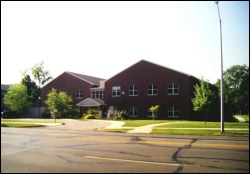
Front Entrance on US Route 40
As times changed, so did the role of the pastor. Ministers generally did not receive advanced education, but relied on their own study of the Bible, as well as personal experiences in the vast arena of life. Rural oriented Brethren from a slower pace began moving to cities, and experienced the faster pace of city life, which required the pastor to assume a more 'executive type' role within the church. Instead of congregations personally involved in witnessing, programs were instituted by churches to transfer money to other agencies with specialized resources for witnessing. As the identity of the church changed, so did the role of its pastor. Instead of the more traditional role of preacher, the minister began to assume the role of program director. This new role required the pastor to assume the role of an executive rather than a lay person. Toward the end of the century, the Brethren founded Schools for training ministers and missionaries. As increasing numbers of ministers graduated from these schools, many congregations openly expressed a desire for an educated pastor instead of the crude rural preacher, who was sometimes referred to as a 'dumb dunker.' The traditional Brethren contended for the eldership controlled selection process, arguing that elders in harmony with the Holy Spirit was the most reliable process. Younger men desired the nomination & ballot method to remove control from elders in closed rooms, because only the latter understood the actual sentiment and plurality of congregations.
Ministers with education and occupational preparation became the requisite of many congregations, and with an increase in ministers assuming professional status, congregations gradually modified their individual responsibility to the community because they began transferring money to other agencies that would perform these duties. Additionally, single role ministers serving as pastors needed more training to facilitate their congregations. Education was becoming a necessary part of ministerial preparation, and a formal school to educate the pastor for the modern congregation became inevitable. In 1905, Albert C. Wieand and Emanuel B. Hoff founded Bethany Bible School in a private home in Chicago after learning that Brethren ministerial candidates were planning to enroll in the nearby Moody Bible School. In spite of continuing opposition to higher education, the Van Buren street campus of Bethany Biblical Seminary was garnered by the Church of the Brethren in 1925. After more than forty years of service, a new facility was constructed west of the Chicago area near the community of Oak Brook, and the name was later changed to Bethany Theological Seminary. The school moved once again to Richmond, Indiana in 1994 to share the campus of the Earlham School of Religion. As the Nineteenth Century was about to draw to a close, education and Brethren ministerial preparation were almost synonymous.
The Story of Bethany: Our Mission & Heritage
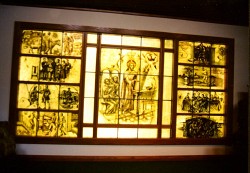
Brethren History in Stained Glass
Bethany is the denominational school for ministerial candidates and was founded by the coordinated efforts of Albert Cassel and Emmanuel Hoff. These two men grew up in the same congregation, but at different times. Hoff was born in 1860 in northern Ohio, but his family moved from the Beech Grove (Chippewa) Church of the Brethren to Iowa. Hoff later graduated from Mount Morris College in Illinois. Wieand was born in 1871 and his German Reformed parents also joined the Brethren at Chippewa because of a deep impression for the Brethren love feast. Wieand studied at Juniata College and then taught at McPherson. During a leisurely campus stroll, the two men happened to met, and developed a friendship that would later blossom in the founding of a Brethren school to train ministers. Wieand had the early inspiration to create the training school. It became a passion with him, for it is said that he dreamed about it 'out loud' to anyone who would listen. Prompted by a 1893 Gospel Messenger article that mentioned of a Brethren student at D.L. Moody Institute of Chicago, Wieand grew concerned that Brethren might seek education in schools outside the denomination, and thus forget traditional Brethren principles and teachings.
Higher education with advanced theological education was not popular with most German Baptist Brethren of the last century. In the Annual Meeting of 1882, heated discussion resolved that Brethren should not even fellowship with persons that were disposed towards formal college training. It was a different culture and religious climate that would prove to be a formidable exercise in persuasion for Wieand and Hoff. Ultimately it was a mixture of both their efforts combined with a progressive sensitivity among the Brethren that young ministers should have a more formal theological understand of the Bible. In fact, the situation almost reversed itself after the turn of the Twentieth century, for with the growing number of Brethren colleges, the greatest opposition to the Bible school appeared to come from opponents who feared that the Brethren already had 'too many' schools. Others tried to persuade Wieand and Hoff to affiliate the school under one of the existing colleges. Before long, each Brethren college was offering more courses in religious studies and even degrees.
The still unmarried Wieand and the married Hoff with family decided to visit Palestine together and visit the holy places. It was an opportunity for them to not only validate what they already believed, but to more deeply appreciate the circumstances that made each place a holy site. Boarding a ship in New York they traveled third and later second class on their way to the Mediterranean, so as to save their finances for the Holy Land itself. This experience created a special bond that would energize them to overcome any opposition to their Bible school. Hoff purchased a large dwelling for his family on Hastings Street in Chicago, and opened it for use by the school. His personal library became the library of the school. Rooms became classrooms and Wieand rented neighborhood apartments which he sub-let to the students. Opening day was October 3, 1905. Wieand became its first president until 1932. Hoff started teaching from the first day of class until his death in 1928. Originally there were twelve students which grew to thirty-three by the end of the first year. This was a unique experience, in that no existing precedents or traditions for a seminary existed in the Church of the Brethren. Wieand and Hoff were able to mold the school, one administrative decision at a time, to develop a curriculum and program that would be distinctly created along Brethren principles.
Although the Hasting Street property served to officially launch Bethany Bible School, it was obvious to Wieand and Hoff from the very beginning, that it could only be temporary. Wieand later discovered a more suitable lot on Van Buren Street, and they began raising the necessary funds to buy properties from the surrounding land owners. In 1909 the first building was erected on the school's second campus at 3435 West Van Buren Street, and recognition by the Church of the Brethren Annual Conference came the same year, followed by an action in 1925 to establish a more direct affiliation with the Conference. Rapidly expanding enrollment necessitated further construction, which was achieved through much prayer and sacrifice. The first Bachelor of Divinity degree was granted in 1913. The name of the school was officially changed in 1931 to Bethany Biblical Seminary. As declared in the articles of incorporation, the objective of the Seminary was "to promote the spread and deepen the influence of Christianity by the thorough training of men and women for the various forms of Christian service, in harmony with the principles and practices of the Church of the Brethren.
In 1957, the Board of Trustees approved the relocation of the seminary to an area near the city of Oak Brook, Illinois. In June of 1963 the official title of the school was changed to Bethany Theological Seminary to more properly represent it's now wider curricula, and the seminary commenced to enjoy life on it's new and third campus in the fall of that year. This new campus offered modern facilities for resident students to live, more up to date and larger classrooms for instruction, and a general suburban location that offered a more conducive atmosphere for learning, including it's own lake. But economic hardships would altimately face the school over the next thirty years. In 1992, Bethany leadership approached Brethren Benefit Trust for a loan that would allow them to relocate to a more economically feasible campus, and the very next year the school began sharing the campus of Earlham School of Religion in Richmond, Indiana. To further serve the needs of prospective students of the denomination, considering that the greatest percentage of Brethren live near Pennsylvania, the Seminary opened an off-site extension program known as the Susquehanna Valley Satellite on the campus of Elizabethtown College in October 1993. Two graduate degrees are now offered, Master of Divinity and Master of Arts, and the Seminary periodically invites the general public to attend workshops for training by either resident professors or guest instructors.
A history of locations...
1909-1963 ~ Van Buren Campus 3435 West Van Buren Street, Chicago, Illinois
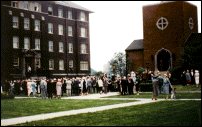 |
| Bowman Chapel Courtesy ~ Forrest Gordon |
The vision of an institution of higher educational for the Church of the Brethren was realized in October, 1905 by Albert C. Wieand in association with Emanuel B. Hoff. Known initially as the Bethany Bible School, the venture began with twelve residents who met in the Hoff home on Hastings Street in the near-south side of Chicago. In 1909 the first building was erected on the school's second campus at 3435 West Van Buren Street. Rapidly expanding enrollment necessitated further construction, which was achieved through much prayer and sacrifice. The first Bachelor of Divinity degree was granted in 1913. Recognition by the Church of the Brethren Annual Conference came in 1909, followed by an action in 1925 to establish a more direct affiliation with the Conference. The name of the school was officially changed in 1931 to Bethany Biblical Seminary. As declared in the articles of incorporation, the objective of the Seminary was to promote the spread and deepen the influence of Christianity by the thorough training of men and women for the various forms of Christian service, in harmony with the principles and practices of the Church of the Brethren.
1963-1994 ~ Oakbrook Campus Oakbrook, Illinois
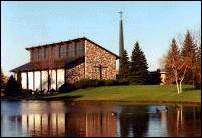 |
| Nicarry Chapel Courtesy ~ David Shetler |
In 1940 the seminary was fully accredited by the American Association of Theological Schools (now called the Association of Theological Schools in the United States and Canada) and through the years has maintained this accreditation. Accreditation by the North Central Association of Colleges and Secondary Schools through its Commission on Institutions of Higher Education was granted in 1971, and this also continues. In 1957, the Board of Trustees approved the relocation of the seminary to an area near the city of Oak Brook, Illinois. In June of 1963 the official title of the school was changed to Bethany Theological Seminary to more properly represent it's now wider curricula, and the seminary commenced to enjoy life on it's new and third campus in the fall of that year. This new campus offered modern facilities for resident students to live, more up to date and larger classrooms for instruction, and a general suburban location that offered a more conducive atmosphere for learning, including it's own lake.
1994-Present ~ Richmond Campus 615 National Road West, Richmond, Indiana
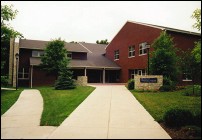 |
| Chapel & Classrooms Courtesy ~ Ron Gordon |
In 1992 the Bethany Board approved the relocation of the Seminary to Richmond, Indiana for affiliation with the Earlham School of Religion and in partnership with the congregations of the Church of the Brethren. That relocation was completed in time for the opening of school in the fall of 1994. Two graduate degrees are now offered, Master of Divinity and Master of Arts. Periodically, the seminary invites denominational leadership and the general public to attend workshops for training by either resident professors or guest instructors. In October 1993, Bethany began its first ongoing off-site extension program with the Susquehanna Valley Satellite, located on the campus of Elizabethtown College. Because of the heavy population of Brethren in Pennsylvania and neighboring states, the Satellite will offer many students the opportunity to acquire their education without moving their families. The administration of the school has now been turned over to both the Atlantic-Northeast and PA Southern Districts.
Presidents of Bethany
Albert C. Wieand 1905-1932
Daniel W. Kurtz 1932-1937
Rufus D. Bowman 1937-1952
Warren Slabaugh 1952-1953 (acting president)
Paul M. Robinson 1953-1975
Warren F. Groff 1975-1989
Wayne L. Miller 1989-1992
Eugene F. Roop 1992-2006
Ruthann Knechel Johansen 2007-2013
Jeffrey Carter 2013-Present
“Study to shew thyself approved unto God, a workman that needeth
not to be ashamed, rightly dividing the word of truth.”
2 Timothy 2:15